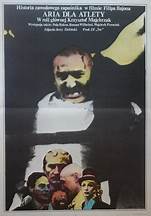|
Description
|
Usually, if a rookie doesn't sin too much against the rules of film narration and can still mark his human and artistic sensibility, he's considered a revelation. For this video, reviewers were looking for a different scale. Filip Bajon's debut was not a modest measures for later madness, but just "madness". The loosely treated story of the famous wrestler Zbyszek Cyganiewicz (in the film Góralewicza) served as an excuse for creative cinema, about which the articles were written by sophisticated connoisseurs of all plays" - so summed up the meaning of "Aria for athletics" monthly "Film" sixteen years after the premiere of Bajonowy debut. Even today, it is difficult to remain indifferent to this extraordinary, on-screen work. The old master wrestler Władysław Góralewicz wants to offer the local opera a collection of book-Atlases, which he won "in the days of his glory". He tells the story of his career to the journalists who came. Around 1880 - a young boy from Galician Stanislaus wants to join the circus Siedelmayer. The director asks him if he already has "his story". Then it is Góralewicz who decides that he will become an athlete. After years, he re-arrives in Siedelmayer. To test his wrestling predisposition, the director subjects him to a test of endurance, from which Góralewicz emerges victorious, albeit with a severely injured head. In the circus Góralewicz befriends Bolcie, a buffoy, a strong man, an amateur of cat meat and cyclops - a man who dazzled with effort, tearing a thick chain. In Siedelmayer Góralewicz suffers the first injustice. He fights Specht, but the fight is to be finged. Specht takes turns knocking down specially substituted candidates, while the bookmacher in the audience accepts bets. Góralewicz, contrary to the agreement, defeats the "invincible" right away. Specht's buddies, the Absów brothers beat the Highlanders and drive the naked out of the circus. From now on, the main goal of Góralewicz will be to play on the Absach. He is chasing them all over Europe. Through the intercession of Bolcia Góralewicz finally goes from jarmarnic buds to a real circus, to the athletic ring. He is engaged by a certain Hitzler, transports him to Charlottenburg. There, for the New Year 1900, Góralewicz will perform in the opera hall next to the famous tenor Messalini. And there he will meet the exalted Cecylya, who will then become his wife. Góralewicza engages the director of the circus Breitkopf, competing with the circus Knappa. Góralewicz falls victim to breitkopf's machinations, which uses his hatred of the Abs to settle his accounts with Knapp. Góralewicz from the arena challenges the Abs, although he knows that the contract with Knapp does not allow them to take on the challenge. An angry mob set fire to the Knapp circus. Breitkopf is murdered. Highlanders with Bolcie have to flee. They find Cyclops sick and blinded in the house of the elderly. On his deathbed, Cyclops urges friends to go to Portugal. There they meet a friend of the Russian, Popov, who proposes to Bolci to participate in the bull fight. Bolcio fights the fanfare and dies. In Paris, Góralewicz meets the younger Abs. He fights him at casino de Paris, where Siedelmayer, a former circus director, is a waiter. Góralewicz's victory brings him fame, he is presented to Prime Minister Clemenceau as a great Pole. Having married Cecylia, he leads a luxurious existence. He is only concerned about the fact that the tenor Messalini is constantly spinning around them. Góralewicz no longer thinks of the elder Absa, but the same forces him to fight. Góralewicz fights in gentlemanly, threatened with defeat adopts the brutal rules of the opponent's game and kills Abs in the arena. That same night, Messalini seduces his wife. Although the subject of the film gave numerous excuses for nod to the so-called mass viewer, Filip Bajon did not focus on accentuating the drama of subsequent fights or glamorous close-ups of muscular male bodies. He made a film about unusual artistic beauty, in individual scenes referring m.in. to Toulouse-Lautrec canvases, Beardsley graphics and lithography by Felicien Rops. Visual and color-coloured "Aria..." he also encouraged critics to compare himself to films by Federico Fellini and Ken Russell. In the history of Góralewicz, sensationally played by Krzysztof Majchrzak, there were also references to important philosophical currents of the Modernism era. The famous wrestler embodies on the one hand the non-Tzschean cult of strength, struggle, vitality; on the other hand, such a spiritual tear and the sense of existence in the practice and contemplation of art, which is so typical of fine de siecle. [PAT] (https://filmpolski.pl/fp/index.php?film=12744)
|


